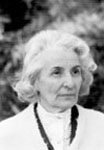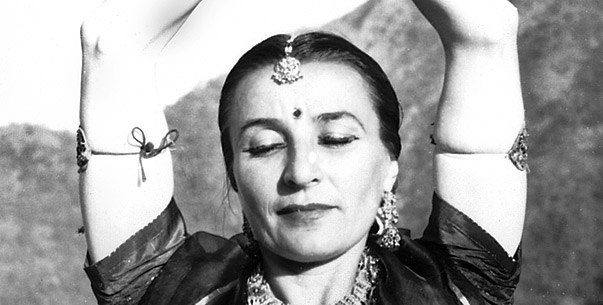|
|
 |
from the archives: swami radha
a wheel in motion
examining the potential of our own hidden wisdom
|

photo courtesy of yasodhara ashram
The basic powers of human life are formidable. For many people, sexual energies are very difficult to conquer. But we have to start sometime. If you want to be free and not be enslaved by your own sexuality, it is wise to examine that power. What do you want out of sex? What do you attach to it?
The element of power called the Kundalini force resides in the first cakra, the Muladhara. If the soul had a place in the body, it would be at the base of the spine. Kundalini is symbolized as a serpent, and in mythology the serpent is symbolic of power that can either lead us into temptation or endow us with a hidden wisdom.
In the Kundalini system, there are seven cakras. The word cakra means “wheel” and a wheel implies motion. The sages understood that life is movement. We can observe how nature is in constant change, and if we are attentive, we can see similar movement in ourselves and in our relationships. In the first few years, a relationship is very different than it is ten or twenty years later. We are like plants that grow and develop, particularly if we want to develop. Then we don’t want to stay immature, even though we may appreciate the enthusiasm of youthfulness.
To engage in more conscious development, we can ask: What is my potential? And what do I need to do to discover this highest potential within me – whether we call it “soul,” “Kundalini” or “Consciousness”?
Most people use the basic energies available in sex. Already we diverge from the purpose of sex (which we know is for procreation), and bend it to our pleasure. Then the unfortunate tragedies begin. A woman becomes pregnant and wonders: Do I want to have this baby? Will I see it only as an unwanted byproduct of pleasure? And if I have a child and end up alone, will I regret the responsibility?
This example points to the responsibility we have for using the powers that are available to us. Our actions have effects that can hinder our whole lives. History shows us, for instance, that unwanted children are abandoned, sold into slavery or traded for sexual pleasures. There is no country free of child abuse and a sometimes murderous lack of responsibility.
The power of sex to create comes from the Most High, in whatever way we understand that. This power can also be given back. If we have clarified that sex is a biological function and that love is not necessarily the motivating force, and in fact is present very rarely, then we have entered a deeper level of thought. It does not mean there is no love, but that the demands of love are very high. If you love someone, “because I’m accepted, because there’s a very nice relationship, because there’s an affinity, because… because… because...” – when you remove the “because,” what happens to the love?
What is it that you want from life? Some scientists say that we are just vehicles for our genes and we have no control over our actions. Is that true? In yoga, human beings are considered to be at different stages of development. In the first three stages, we may be controlled by instinct and genes. But on the yogic path, we want more than that. We want to control even what scientists consider “involuntary” systems and the mammalian part of the brain.
The question then is: Do I want to have liberation from all that hinders me and that keeps me a slave to habits and untested beliefs? Asking this question is the start to a more aware and earnest life.
Look at sex, birth and death as one unit. We can’t really separate them. We make strenuous efforts to avoid birth because we are afraid of death. And birth and death are dependent on the decision of how we use that awesome power of procreation. Can we use the power in other ways – in artistic or creative ways, instead of just for self-gratification? And is it better to make some attempt to achieve self-mastery, rather than no attempt whatsoever?
Kundalini Yoga is a path of liberation. You make the decisions. You carry the responsibility, and only you have to deal with the consequences, or more precisely, with your karma.
A pioneer in bringing yoga to the West, Swami Sivananda Radha is the author of 10 classic books on yoga, including Kundalini Yoga for the West and Hatha Yoga: The Hidden Language. Her teachings focus on developing awareness and quality in life.
|